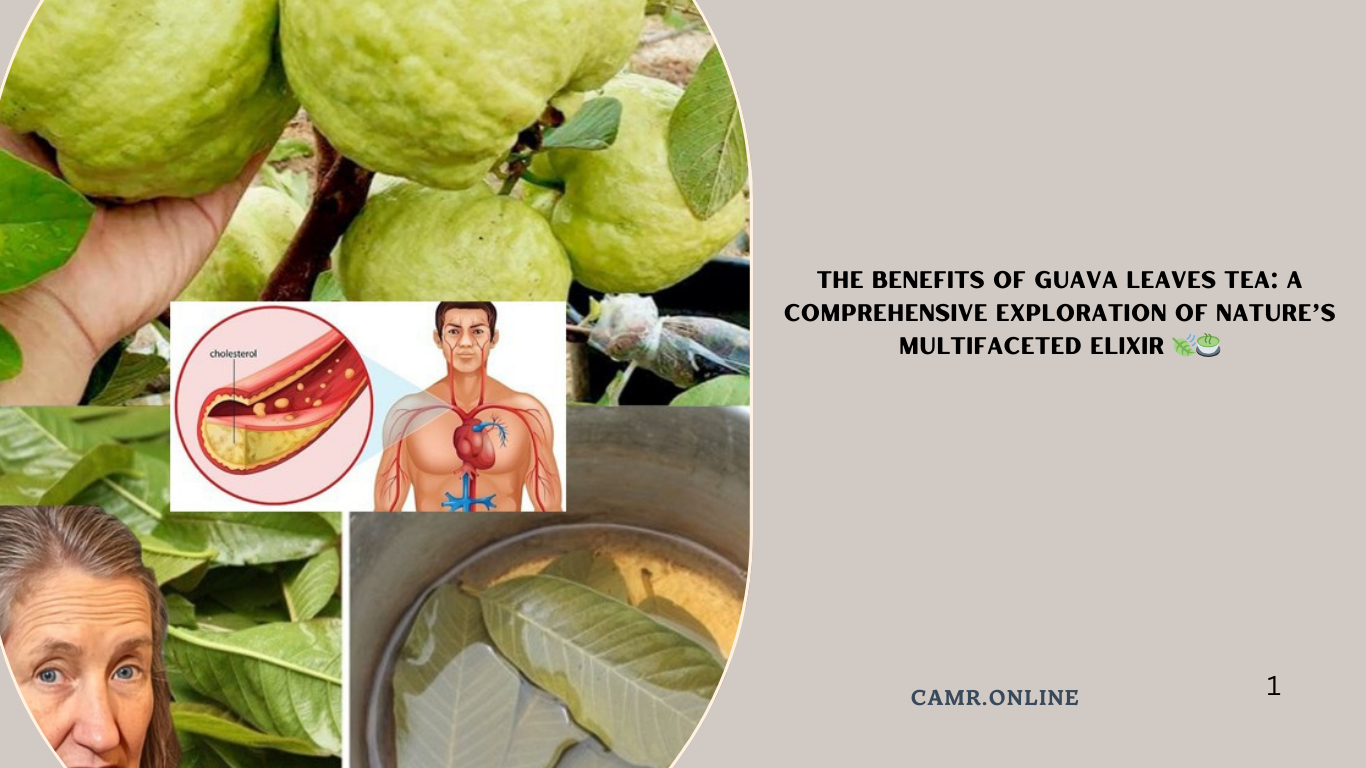Guava leaves tea, brewed from the leaves of the guava tree (Psidium guajava ), has been celebrated for centuries in traditional medicine for its numerous health benefits. Rich in antioxidants, vitamins, and minerals, this herbal tea offers a range of advantages that support overall well-being. Whether you’re looking to boost your immune system, manage weight, or improve digestion, guava leaves tea could be the natural remedy you’ve been searching for.
In this article, we’ll delve into the many benefits of guava leaves tea, explore how to prepare it, and provide tips for incorporating it into your daily routine. Let’s dive in!
What Are Guava Leaves?
Guava leaves are the green, oval-shaped leaves of the guava tree, native to tropical regions like Central America, Africa, and Asia. While the fruit is widely consumed, the leaves have long been used in traditional remedies due to their potent medicinal properties. When dried and steeped in hot water, these leaves create a fragrant tea with a mild, earthy flavor.
Why Guava Leaves Tea Deserves Attention
Before exploring its benefits, here’s why guava leaves tea deserves a place in your wellness routine:
- Rich in Antioxidants : Guava leaves contain high levels of polyphenols, flavonoids, and other antioxidants that combat oxidative stress.
- Natural and Affordable : Unlike synthetic supplements, guava leaves tea harnesses the power of nature without breaking the bank.
- Versatile Uses : Beyond drinking as tea, guava leaves can also be used topically or added to culinary dishes.
- Scientifically Backed : Modern research supports many of the traditional claims about guava leaves’ health benefits.
Top Health Benefits of Guava Leaves Tea
1. Boosts Immune System
Guava leaves are packed with vitamin C, an essential nutrient known for strengthening the immune system. Drinking guava leaves tea regularly may help protect against colds, flu, and other infections by enhancing your body’s defense mechanisms.
2. Supports Digestive Health
Guava leaves contain compounds that promote healthy gut bacteria and reduce inflammation in the digestive tract. This makes them effective for alleviating symptoms of indigestion, bloating, and even diarrhea. Additionally, their antibacterial properties can combat harmful pathogens in the intestines.
3. Aids Weight Management
Studies suggest that guava leaves inhibit the absorption of carbohydrates, making them a potential ally for weight management. By slowing down carbohydrate metabolism, they may help control blood sugar levels and curb cravings.
4. Promotes Heart Health
The antioxidants in guava leaves tea help lower bad cholesterol (LDL) while increasing good cholesterol (HDL). It may also regulate blood pressure and improve circulation, reducing the risk of cardiovascular diseases.
5. Regulates Blood Sugar Levels
For individuals with diabetes or prediabetes, guava leaves tea shows promise in regulating blood glucose levels. Research indicates that it slows down the conversion of starches into sugar, helping maintain stable energy throughout the day.
6. Soothes Skin Issues
Applied topically or consumed as tea, guava leaves possess anti-inflammatory and antimicrobial properties that benefit the skin. They can soothe acne, eczema, and other inflammatory conditions while promoting healing.
7. Reduces Inflammation
Chronic inflammation is linked to various health issues, including arthritis and autoimmune disorders. Guava leaves tea contains quercetin, a powerful anti-inflammatory compound, which helps calm inflammation naturally.
8. Supports Oral Health
Chewing fresh guava leaves or rinsing with guava leaves tea can improve oral hygiene. Their antimicrobial effects fight bacteria responsible for gum disease, bad breath, and cavities.
9. Enhances Brain Function
The presence of antioxidants and vitamins in guava leaves tea protects brain cells from damage caused by free radicals. Regular consumption may enhance memory, focus, and cognitive function.
10. May Help Prevent Cancer
Packed with antioxidants like lycopene and vitamin C, guava leaves tea combats oxidative stress—a major contributor to cancer development. While more research is needed, early studies show promise in its ability to inhibit cancer cell growth.
How to Prepare Guava Leaves Tea
Making guava leaves tea is simple and requires just a few ingredients. Follow these steps for a delicious cup of this herbal elixir:
Ingredients:
- 6–8 fresh or dried guava leaves
- 4 cups water
- Optional: Honey, lemon, or cinnamon for flavor enhancement
Instructions:
- Rinse the guava leaves thoroughly under running water to remove dirt or debris.
- Bring 4 cups of water to a boil in a pot.
- Add the guava leaves to the boiling water and let them simmer for 10–15 minutes .
- Strain the liquid into a mug, discarding the leaves.
- Sweeten with honey or add a squeeze of lemon for extra flavor if desired.
- Enjoy warm or chilled, depending on your preference.
Tips for Incorporating Guava Leaves Tea Into Your Routine
- Start Small : Begin with one cup per day to assess how your body responds before increasing intake.
- Combine with Other Herbs : Mix guava leaves with mint, ginger, or lemongrass for enhanced flavor and additional health benefits.
- Store Properly : Dry guava leaves in a cool, dark place to preserve their potency. Alternatively, purchase pre-dried leaves online or at health food stores.
- Use Fresh Leaves When Possible : Fresh leaves offer maximum nutritional value, but dried leaves work well for convenience.
Scientific Studies Supporting Guava Leaves Tea
Research continues to validate the traditional uses of guava leaves tea. Here are some highlights:
- A study published in the Journal of Ethnopharmacology found that guava leaf extract significantly reduced blood glucose levels in diabetic patients.
- Another study highlighted its antimicrobial properties, showing effectiveness against common pathogens like E. coli and Staphylococcus aureus .
- Its anti-inflammatory effects were demonstrated in a review published in the International Journal of Molecular Sciences , underscoring its potential for managing chronic conditions.
Fun Facts About Guava Leaves
- Historical Significance : In ancient cultures, guava leaves were used to treat wounds, fever, and digestive ailments.
- Global Popularity : From Brazil to India, guava leaves are revered for their versatility and health benefits.
- Environmentally Friendly : Using guava leaves reduces waste and promotes sustainable practices, as every part of the plant is utilized.
Precautions and Side Effects
While guava leaves tea is generally safe, moderation is key:
- Pregnancy and Breastfeeding : Consult a healthcare provider before consuming guava leaves tea during pregnancy or breastfeeding.
- Medication Interactions : If you’re taking medications for diabetes, heart conditions, or other chronic illnesses, check with your doctor to avoid interactions.
- Allergic Reactions : Though rare, some people may experience allergic reactions to guava leaves. Discontinue use if irritation occurs.
Conclusion
Guava leaves tea is a treasure trove of health benefits, offering everything from immune support to improved digestion and heart health. By incorporating this herbal brew into your daily routine, you can tap into nature’s wisdom and enjoy a healthier lifestyle.
So next time you’re at the market or exploring your garden, consider picking up some guava leaves to brew a soothing cup of tea. Your body—and taste buds—will thank you! 🍃✨







